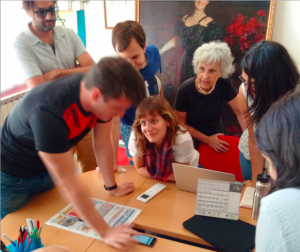CULTURE Which Values for the Economy
The economy and its inner dynamics are essential to understanding how the world is changing. This is the main idea that inspired the three-day conference, “Markets and Values” (16-18 of June), organized by Pagine Ebraiche in Florence. At the third edition of the conference, the main issues discussed through the lenses of a Jewish perspective were the future of the publishing industry, the roots of economic inequalities connected to the creation of ghettos, the immigration emergency in Europe and how the city of Florence is dealing with it. Also discussed were how Italian society perceives minorities in the country and how technology is capable of simplifying everyday life.
One guest at the conference was the publisher Giuseppe Laterza, who leads the well-known Italian publishing house, Laterza. He discussed the crisis of the book market in Italy, expressing his concerns for the cultural situation of the country.
“Italy is a place where we rarely debate issues and very often when we do it is not done correctly.” Laterza is also one of the promoters of the Economic Festival of Trento, a city in the north of Italy. The Festival features many international speakers: this year, the Nobel Prize winner for Economy Joseph Stiglitz, New York Times editorialist, Paul Krugman and the famous economist Thomas Piketty.
“Today the success of a festival is no longer about how easy or difficult the topic is. It is more about how people perceive its importance and the sense of belonging to a community,” said Laterza.
Sara Funaro, City Council member of Florence for integration and equal opportunities, talked about the city’s immigration policies. She explained how the municipality is trying to face the refugee emergency in Italy for those arriving from North Africa and the Middle East. One of the projects she focused on is the one in partnership with the Jewish Community of Florence that offers a house to host some refugees. “We call it the ‘Little Jerusalem’, because the eight people hosted are Muslims and it is a good example of coexistence between different cultures and traditions,” she said.
The historian Giacomo Todeschini talked about inequalities and showed how there is a direct connection between the current situation and the creation of ghettos in the sixteenth century. This was the beginning of the residential segregation of Italian Jews from society. The concept of ghettos will be analyzed by Todeschini in a book to be published in early 2016.
“If I had to point out the biggest risk for Italian Jews today, I would say indifference, the danger of not being perceived by society,” noted during the conference speaker, Riccardo Grassi, research director of the SWG, one of the leading Italian research center on social issues and public opinion based in Trieste. Grassi mentioned the situation of minorities in Italy and analyzed the success of some right wing parties and their xenophobic and discriminatory approach.
Among the speakers that participated at the event in Florence were the journalists Carlo Marroni, an expert on Vatican affairs for the daily Sole 24 Ore, Claudio Della Seta, managing editor of the Italian Channel 5 News, and the young start-uppers’ Nicolas Nemni, Gadi Piperno Corcos and Federico Baldi Lanfranchi.

